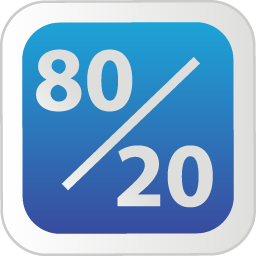How’s your marketing? Let me guess—some things you do work better than others, some don’t work at all, some strategies you enjoy, some you won’t touch with a ten-foot pole.
The Pareto Principle, aka The 80/20 Rule, can help.
The idea is to examine all of your options, do more of what works, and eliminate or do less of everything else.
The Pareto Principle says that in any endeavor, “a minority of inputs or actions tens to yield the majority of outputs or results” and that minority is often around 20%. If you use 10 marketing strategies in your practice, you’re likely to find that just 2 of those strategies bring you most of your new clients, repeat business, leads, referrals, etc.
And if it’s not 20%, it’s probably close to it.
It’s not just the strategies you use, however. For referrals, you might find that 20% of your referral sources, whether clients or professional contacts, provide you with 80% of your total referrals. Knowing that allows you to give those referral sources more attention and increase your referrals.
If you use paid advertising, you might find that 80% of your leads or inquires come from just 20% of your keywords or publications. You can significantly improve your results by spending more dollars on your best performing publications or keywords and less on the rest.
The actual numbers aren’t critical. What’s important is that you examine your activities and your results, focus your time and dollars on the “precious few” activities that deliver the majority of your results, and ignore or do less of the “trivial many” that don’t.
So, you have to look at your numbers. But don’t be ruled by them.
If you’re good at something, speaking or writing for example, and you enjoy doing those things, do more of them, even if they don’t (yet) deliver big results.
Why? Because the most important and valuable part of marketing isn’t the specifics of what you do, or how you do them, it’s that you do something.
Anything that qualifies as marketing is good. Especially in a profession where resistance to marketing is so pronounced.
Doing any marketing is the “20% that delivers 80% of your results”.
Because it will lead to new ideas, relationships, and opportunities that would otherwise never materialize.
Do something you enjoy. Eventually, the numbers will come.








